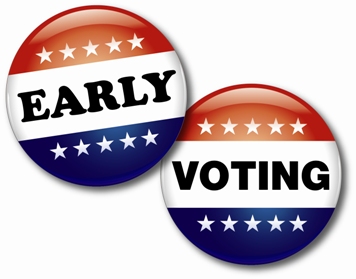By Barry Rascovar
For MarylandReporter.com
We’ve had our share of recent news stories on increased early voting prior to Maryland’s June 24 primary election.
From those reports — such as MarylandReporter’s “Record turnout of 141,590 for early voting,” — it sounds like this reform is catching on, right? Making it easier to get more people to participate in elections, right?
That bit of conventional wisdom is wrong. Dead wrong.
Early voting doesn’t increase turnout, despite all the hype surrounding this much-ballyhooed reform.
It may not be politically correct to say this but researchers have found early voting actually decreases overall voter turnout. Honest.
‘Negative unanticipated consequences’
A detailed analysis of voting in the 2004 and 2008 presidential elections by political scientists at the University of Wisconsin came to the following conclusion:
 “Early voting has created negative unanticipated consequences by reducing the civic significance of elections for individuals and altering the incentives for political campaigns to invest in mobilization.”
“Early voting has created negative unanticipated consequences by reducing the civic significance of elections for individuals and altering the incentives for political campaigns to invest in mobilization.”
The researchers concede, “This result is counterintuitive, and it certainly runs against the grain of conventional wisdom.” But facts are facts.
This 2013 study, published in the American Journal of Political Science and funded by Pew Charitable Trusts, found early voting has the effect of “dissipating the energy of Election Day,” which historically has focused “social and political activity on a single day [that is] abuzz with discussion, media coverage and last-minute contact from parties and candidates, factors that can exert a mobilizing impact on a wider group of potential voters.”
Maryland experience proves the case
Look at early voting in Maryland since it was introduced in 2010.
In that year’s gubernatorial primary, 2.44 percent of registered citizens filled out their ballots early. Yet that didn’t help overall turnout, which was a dreadful 24 percent.
This year’s early voting in the 2014 gubernatorial primary saw a rise in participation to 4.17 percent, thanks to two extra days and 17 new sites. Yet Election Day turnout on June 24 is expected to drop well below 2010’s voter participation numbers.
Look at results from early voting in the last presidential election.
The number of pre-Election Day voters in Maryland’s 2012 November voting jumped to 11.6 percent. Still, the overall turnout that year was 73.5 percent — the lowest percentage turnout in a presidential election since 1996.
Clearly, early voting doesn’t — as commonly believed — boost participation in the election process.
The Willis report
Maryland’s elections board commissioned a study by the University of Baltimore’s Schaefer Center for Public Policy, led by noted election authority John T. Willis, a former Maryland secretary of state.
UB political science researchers examined the nationwide trend in early voting and reported earlier this year: “[T]here has been a growth in the number of individuals voting early over the past 20 years without a directly corresponding increase in voter turnout as a percentage of registered voters. . .”
In other words, early voting makes it easier for folks who usually vote to do so. They already are highly motivated. Early voting lets them more readily fit a trip to the polls into their schedule. But the notion that early voting increases turnout is a canard.
What will boost participation in elections is Election Day registration.
The University of Wisconsin political scientists discovered that in 2004 and 2008 states offering Election Day or same-day registration increased voting by three or four percentage points.
They point out that earlier studies, stretching back 20 years, indicate the increase in turnout from same-day registration can be as high as seven percentage points.
‘One-stop shopping’
Data from the 2004 and 2008 presidential elections demonstrated to researchers that states can improve voter turnout by “offering one-stop shopping and allowing individuals who become interested late in the campaign to be mobilized into voting.”
Maryland will dip its toes into same-day registration waters in two years when people can legally register at early-voting sites and then cast their ballot.
If this works well, Election Day registration could become a legislative imperative in the Annapolis State House.
Those who still believe early voting eventually will increase turnout need to press for improvements in Maryland’s current system.
Improve the current system
Twenty more early voting sites are on the way in 2016 but that’s not early enough, especially in large and rural counties.
Early voting hours don’t mesh with Election Day hours. You couldn’t go to the polls before starting work last week because voting sites didn’t open till 10 a.m. That’s ridiculous. It discriminates against working Marylanders and discourages participation.
State leaders also need to step up financially and start subsidizing early voting. This would encourage local governments to open more sites and actively promote and advertise the convenience of voting early.
The state’s early-voting law is now an unfunded mandate from Annapolis. That ought to change. The state should bear more of the direct costs for holding statewide elections.
No panacea
Yes, early voting is convenient. It’s a service to those already registered to vote. It is growing in popularity. That trend is likely to continue. But it has not increased turnout.
Indeed, it has lowered overall participation by as much as four percentage points, according to the University of Wisconsin researchers.
Other election reforms are required to get more Americans to the polls.
Feel free to comment on this column in the space below.
You can read Barry Rascovar’s musings at his blogsite, www.politicalmaryland.com.




Recent Comments